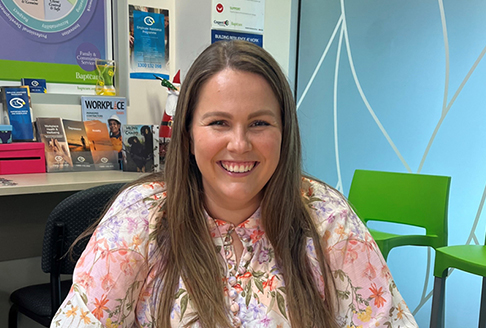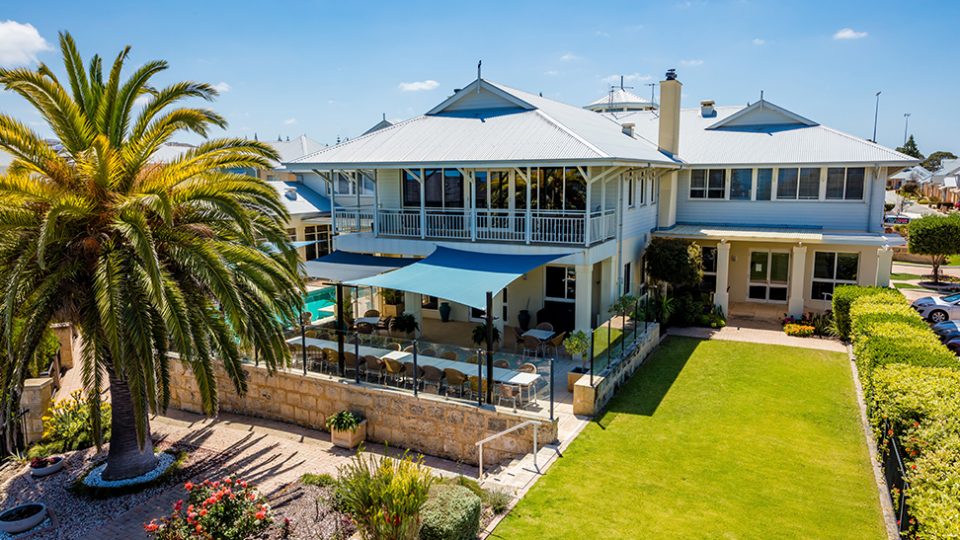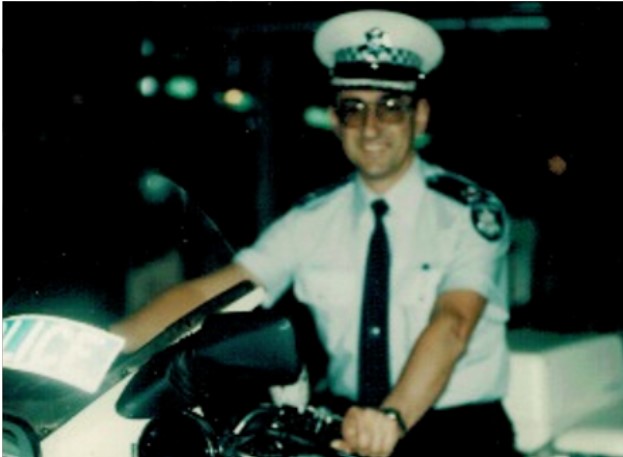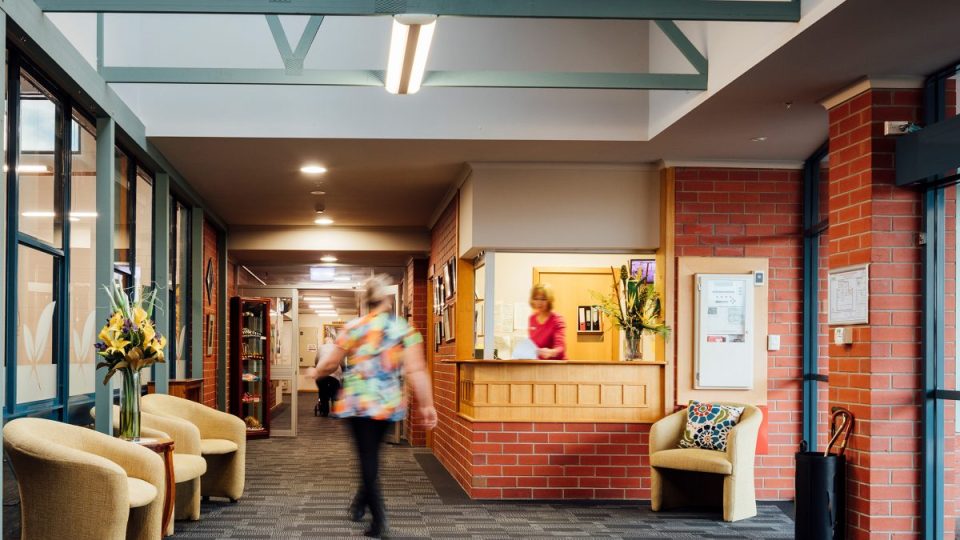Faces of Baptcare | In honour of this week’s International Day of Families, meet Kelsey from our Tasmanian Family Services Team
- 16 May 2024

Let’s start with some facts! How long have you worked at Baptcare, what is your current role and what does it involve day to day?
I’ve worked at Baptcare for three and a half years. I’ve got two titles: I’m a Family Services Practitioner in the Integrated Family Support team and I’m also the Project officer of Mothers in Mind and Caring Dads groups.
What’s involved in these groups?
Mothers in Mind is a therapeutic playgroup.
Caring Dads is a group working alongside Dads who have used abuse and violence in their parenting environments.
Both groups are specific to Tasmania.
What’s special about these groups?
Starting with the Mothers in Mind group – the best thing we see is that it fosters a connection between mothers and their children who often join the group from a background of trauma. For example, they may have experienced (or are experiencing) mental health issues and/or family violence. It is so wonderful to see the mothers and their children actually feeling safe enough to play by the end of a session with us. It’s a safe space where we do work in small groups so as not to intimidate our participants. We start by modelling positive parenting behaviour and quickly see them mirroring our lead.
Part of my role is as a Family Services Practitioner, where I am currently supporting seven families. I visit the families once a week in their homes to build parenting capacity and/or perhaps assist in reengaging the parents and children with school. I work with the families once a week over a 12-month period.
We provide mentoring and advocacy work, while also assisting them to identify their family goals and how we can best achieve them.
Caring Dads is a17-week group program in which participants can either be referred to us by an external agency like Child Safety or a legal service, internally if they are accessing the Integrated Family Support Service, or they can independently seek out our group. Baptcare deliver content that teaches the Dads how to interrupt their normal thought patterns and implement different ones, and parenting strategies that will support them to experience more positive outcomes and better connection with their children.
One of the most positive parts of Caring Dads is witnessing our Dads having realisations that they weren’t making great decisions in their past parenting and within their relationships, and that they can change their behaviour and make decisions that are different and positive, which can increase family safety.
What drew you to working in this Family Services space?
I did a Social Work degree at the University of Tasmania and during my fourth year, I did a 14-week online placement (during COVID) with the Intensive Family Support Service (IFSS) Team at Baptcare and then was subsequently offered a job with them a few months after graduation.
I always wanted to work with people and young people and now I can work with parents and kids at the same time which is ideal! There’s such an important connection with these two groups of people too, as many issues with children start from parenting issues. Therefore, if we can support parents with skills early, hopefully we can break the negative cycles we see.
And why Baptcare? What keeps you working at Baptcare?
After spending 14 weeks doing my university placement with Baptcare, I knew it was the right place for me.
Baptcare has a great culture. It’s really welcoming and an environment where it’s easy to have a joke and a laugh but can still be serious and supportive when needed. Everyone really wants each other to do well and that’s a great culture to be a part of.
What did you want to be when you grew up? Did you always want to work within the caring space and what are some other jobs you’ve performed in your career?
From the age of 14 I knew that I wanted to be a social worker and that I wanted to help people.
I was very lucky growing up with supportive parents and a good school but I knew there were many people around me who didn’t get those opportunities. I guess my home life was based in caring. My Mum has been working as a nurse for over 35 years and my Dad has a teaching background.
I started volunteering at Edmund Rice camps* during school holidays. These camps ran programs for kids who may not have the opportunity to have those experiences.
(*Ed. Edmund Rice’s mission is: We create a world where children and families who have experienced trauma and adversity can thrive and belong.)
I volunteered at about 30 programs over five years. Now I get to send children who I’m currently working alongside to be participants in their camps and to have those positive experiences too which is very cool.
Can you tell us two surprising things about yourself?
One – I know lots of random pieces of information that are completely useless. For example, kangaroos can’t move backwards.
Two – From the ages of eight to eighteen, I grew up on an alpaca farm in Relbia where we had 60 alpacas. I was a Champion Junior Alpaca Handler in local competitions, including at the Wynyard Agricultural Show, the Royal Launceston Show and the Burnie Show.
Describe your ideal weekend
Time spent in the garden in the sun.
Going to the beach.
Watching the footy (my partner plays state league footy so footy consumes a lot of our life!).
How would your friends describe you?
That I’m not very good at saying no and will offer to help out even if I haven’t got the time!
If you could sit next to someone at a dinner party, who would it be and why?
My Grandma who has passed away. She was a small (4 ft 11) but stoic woman and she’s where I get my random love of trivia!
She was a big reader and very smart. My Grandma and Grandad actually ran trivia nights for North East community events in Tassie.
Can you share a particularly special work day/customer interaction you’ve had recently?
We recently completed a Mothers in Mind group in term 1 of this year, and all of the mums in attendance were really attentive to their children, the group content and to each other. It was evident that they really wanted to be there. As facilitators, we held the space for them but they really made it their own, sharing reflections and advice with each other. Many of them even made plans to continue their friendships at the conclusion of the program. It was a beautiful group.
You can read more about services for families and youth in Tasmania on our website.
https://www.baptcare.org.au/services/family-youth-and-foster-care/tasmanian-services
You can read more about our Caring Dads program on our website.
https://www.baptcare.org.au/why-baptcare/news/baptcare-introduces-caring-dads-program-this-october
Community news
-

BaptistCare to acquire Keyton’s Western Australian retirement village portfolio
BaptistCare is pleased to announce that we have entered into an agreement to acquire Keyton’s portfolio of retirement villages in WA.
- 13 Nov 2025
-

Spotlight on Residents: Reg Baker
At Baptcare, we are always delighted to learn more about our residents’ lives. They are often filled with excitement, joy, and adventure, and it truly reminds us how rich a person’s life is—and continues to be—when they join one of our residential aged care communities. Today, we are honoured to share the remarkable story of one of our residents, Reg Baker, who lives at Baptcare Peninsula View Residential Aged Care community.
- 10 Nov 2025
-

Staff spotlight | Leonie Irvine – 35 years of service in aged care
Leonie is one of our dedicated Lifestyle Assistants at Karingal Residential Aged Care community in Devonport, Tasmania. She recently celebrated an incredible milestone - 35 years of continuous service at Baptcare. In a sector where long-term service is increasingly rare, Leonie’s 35-year journey stands out as something truly special.
- 10 Nov 2025
